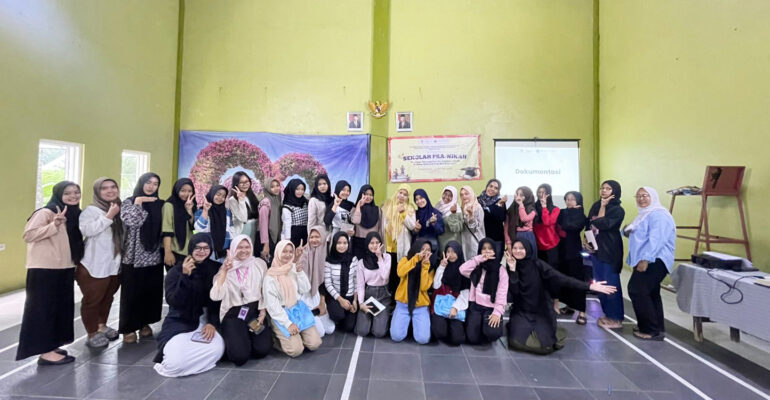IPB University Premarital School Provides Adolescents with Nutritional and Reproductive Health Skills

A number of teenagers had the opportunity to learn about nutrition and reproductive health through the Premarital School of IPB University. The program made by the Directorate of Agromaritime Community Development (DPMA) and the Center for Human Resource Development (P2SDM) of IPB University was held in Sinarsari Village, Dramaga District, Bogor, West Java.
At this meeting, participants received materials on reproductive health and adolescent nutrition. Both materials were delivered by midwife Tini Sagita.
In the first material, midwife Tini explained adolescence as a transition period characterized by puberty. Changes occur starting from physical, psychological, and social. Furthermore, the differences in early signs of sexual maturity between men and women were described in detail.
Furthermore, the midwife introduces signs of pregnancy, miscarriage, and reproductive diseases. As a premarital preparation, teenagers are expected to have physical and psychological readiness as well as socio-economic adequacy.
“Health is a state of physical, mental, and social well-being of a person. Prosperous means being fulfilled as a whole. Teenagers need to be more selective so that they do not regret their actions. Moreover, having sexual intercourse before marriage, the impact is not only pregnancy, but miscarriage because the condition of the uterus is not yet strong,” said midwife Tini.
In the third material, she discussed nutritional health in adolescents. In addition to stunting, the midwife conveyed immunity as an immune system that plays a role in fighting external attacks.
She elaborated that adolescents often experience nutritional problems related to immunity such as underweight, overweight, anemia, and chronic energy deficiency. To avoid anemia, adolescents can take blood supplement tablets once a week or every day during menstruation. Another message is for teenagers to adopt a healthy diet and exercise.
“Fulfillment of carbohydrate, protein, iron, prebiotics, vegetables, fruits, and probiotics needs to be increased. However, consumption of salt and sugar needs to be reduced. Don’t get into the habit of eating foods that are too spicy, salty, savory, or sweet. Nowadays, teenagers are more inclined to non-nutritious foods such as seblak and bakso,” said midwife Tini.
The participants were very enthusiastic in following all the material and question and answer sessions. Participants were also asked to analyze their body condition, especially reproduction and nutrition. The hope is that this meeting can broaden the participants’ knowledge about the importance of maintaining a healthy body for the long term.
With the application of the knowledge gained, the participants are expected to be able to bring positive changes in managing their respective finances so as to realize a healthy body. (*/Rz) (IAAS/Aly)



